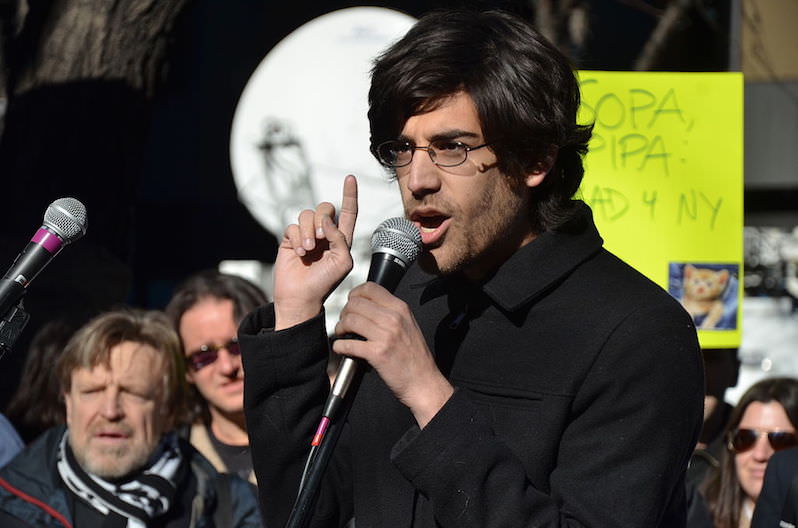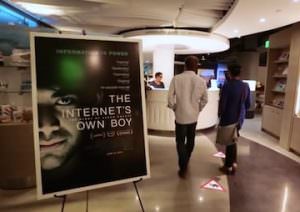Aaron Swartz Day: A Vital Legacy Lives On
A champion of the Internet and governmental reform is celebrated around the world Saturday. His suicide -- committed under a threat of prosecution -- did not end the fight for his causes. Aaron Swartz protests against the Stop Online Piracy Act (SOPA) in 2012. Wikimedia Commons/Daniel J. Sieradski CC BY-SA
Aaron Swartz protests against the Stop Online Piracy Act (SOPA) in 2012. Wikimedia Commons/Daniel J. Sieradski CC BY-SA
Those who change the system sometimes become its victims. Such has been the case for Edward Snowden, Chelsea Manning and Aaron Swartz.
Aaron Swartz died a young man, at 26. He was an Internet activist, a political thinker and a concerned citizen who helped change the technological landscape with his capable hands. He helped shape the RSS feed and collaborated with others to make Creative Commons possible. He co-founded Reddit, sold it and then jumped into the battle to protect the Internet and change the politics of that realm.
While being squeezed in the vise of intense government scrutiny for downloading massive amounts of academic journals from JSTOR, a fee-based digital library he accessed via MIT’s networks, Swartz decided to end his life. No one knows whether his suicide stemmed from the possibility of being a felon or facing a 35-year prison sentence or some other reason, but the Internet lost a guardian on Jan. 11, 2013.
Swartz would have been 28 years this week, on Nov. 8. To celebrate his life and legacy, communities across the globe will observe Aaron Swartz Day on his birthday. He fought for an open and thriving Internet but also for causes like ending corruption and government secrecy, and the day in his honor will mark the full range of his accomplishments and his battles, which remain alive today.
Swartz was adamantly opposed to laws like SOPA and PIPA that he believed would have allowed corporations to shut down free expression and frustrate an open Internet. What many don’t realize is that he also feared government surveillance, well before Snowden arrived. “One thing that Aaron didn’t see—is he didn’t see Snowden,” Brian Knappenberger, director of a documentary about Swartz’s life called “The Internet’s Own Boy,” told Truthdig. “We have footage in the film that talked about Aaron being concerned about NSA surveillance and overreach that was a year before Snowden came forward.”
Knappenberger said Swartz was waiting for a moment when people would realize how serious a problem government surveillance was becoming, and he died before he could witness the Snowden revelations. Instead of learning from what happened to Swartz and being more lenient with Internet activists, “lawmakers in the government just get worse about whistle-blowers and hacktivists by going after them even stronger,” Knappenberger said.
Knappenberger worries when he sees the Obama administration creating “insider threat” programs that encourage people with top-secret clearance to turn in co-workers who they believe might leak information. Sometimes, a recent divorce can be considered a reason for the government to suspect that an employee might leak information. Knappenberger said the U.S. government is targeting legal whistle-blowing instead of dealing with illegal activity such as warrantless surveillance being carried out by its branches.
There have been attempts to ease the punishment of many whom the law currently defines as cybercriminals or to change what that definition means in the first place, but they mostly have been defeated. In June of last year, Rep. Zoe Lofgren of California and Sen. Ron Wyden of Oregon introduced a bill named Aaron’s Law, meant to reform the Computer Fraud and Abuse Act (CFAA) so people will not go to jail for accidentally violating a website’s or network’s terms of service. The proposed law, among other things, also would protect accused individuals against being prosecuted multiple times for the same action.
The bill, which could prevent cases like that of Swartz, looks unlikely to pass. A number of corporations, along with politicians such as Rep. Bob Goodlatte of Virginia, have fought against the bill, which has been stuck in a subcommittee for months. One of the main parties using corporate money and power to block the legislation is the tech giant Oracle.
“Some particular companies offered a fierce attack on common-sense changes to the CFAA due to certain companies’ use of the CFAA not as a statute being used in civil suits to prosecute computer hacking as it was originally intended, but being used to protect trade secrets,” Mark Jaycox, a legislative analyst at the Electronic Frontier Foundation, told Forbes in August.
Knappenberger said, “Aaron’s Law is a common-sense updating of a computer law that was created in the 1980s, after the movie ‘War Games’ with Matthew Broderick. Obviously our lives have changed since the 1980s.” While he understands that companies need to protect their interests, Knappenberger believes that there are “other ways of solving those problems. We don’t need this one-size-fits-all hammer that can get everyone else put in jail,” he said. “It’s as insane as having a law that could put the entire population in jail,” he added, arguing that anyone who violates an insignificant agreement on the Internet — which could involve an act as minor as lying about your age on social media — could end up a felon.The irony is that the corruption Schwartz fought against is the main reason Aaron’s Law has been blocked.
“I’m frankly not surprised at the failure to get Aaron’s Law ratified,” Lawrence Lessig, a friend and mentor to Swartz, told Truthdig. Of course, Lessig isn’t just a onetime associate of Swartz — he’s also a Harvard professor, a political activist and a defender of the Internet. Influenced by Swartz’s advice, he started a super PAC, called the Mayday PAC, that is meant to help elect politicians determined to get big money out of politics. The “Super PAC to end all Super PACs,” the website says.
“When Aaron convinced me to take up the cause of corruption, he was like, ‘Why do you believe you’re ever going to make any progress on the missions that you’re working on before we end the problem of corruption in Washington?’ That was the reason I took on that project,” Lessig said. He isn’t surprised that companies like Oracle and politicians who work with them have been able to block bills such as Aaron’s Law. He believes that real change will not happen until politicians care more about the interests of the people than the interests of corporations, and that the corporations and their political allies are planning to “hold out and let the passion [for reform] pass.”
“When he died, I decided I wanted to make the movement more urgent,” Lessig said. His political action committee has backed eight candidates since it started in May. Though Swartz is no longer around, there are those who fight on in his name. “I don’t know what his legacy is yet—it’s developing—but part of what we’re trying to do is help define his legacy in relation to [campaign finance],” Lessig said. “My hope is that we will succeed in framing his inspiration with this critical issue for democracy.”
Swartz has inspired many and changed the conversation about government surveillance, corruption in Washington and Internet freedom, and there are crucial questions that he raised that will come to mind on Aaron Swartz Day. The future of the Internet and politics will lie either in the hands of the elite or the hands of the people. “We can make [the Internet] what we want to make it, and what kind of Internet do we want?” Knappenberger asked. “Do we want an Internet in which corporations extract every piece of our private data and they sell it for pennies? Do we want an Internet where governments are able to surveil us without due process, without [our] even being suspected of a crime? Do we want this Internet that’s kind of a tool of oppressive regimes to go after dissidents in countries around the world? Or do we want an Internet that is … a tool for openness in government and a better understanding of the kind of problems that we have and a tool for expression and creativity? I think we’re basically at a point where we need to decide that.”
Knappenberger thinks there’s one thing Swartz said that could help determine the future. “[Aaron] said you should ask yourself this basic question: If I can make the world a better place, generally, not in this bullshit Silicon Valley slogan kind of way, but if you can actually make the world a better place, what’s your argument for not doing that?”
Swartz showed that one person can make a huge difference, and through his still-evolving legacy his influence continues worldwide.
Your support matters…Independent journalism is under threat and overshadowed by heavily funded mainstream media.
You can help level the playing field. Become a member.
Your tax-deductible contribution keeps us digging beneath the headlines to give you thought-provoking, investigative reporting and analysis that unearths what's really happening- without compromise.
Give today to support our courageous, independent journalists.




You need to be a supporter to comment.
There are currently no responses to this article.
Be the first to respond.